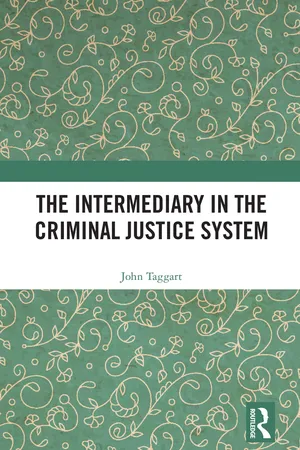
- English
- ePUB (mobile friendly)
- Available on iOS & Android
The Intermediary in the Criminal Justice System
About this book
This book undertakes a sociolegal examination of the intermediary role within the criminal justice system.
The intermediary special measure is one of the most innovative and controversial developments in the history of English criminal procedure. But what does the role actually involve? That is the central question explored in this book. Despite increased academic attention into this new criminal justice actor, the content of the intermediary role remains unclear. Based centrally on empirical data gathered in England and Wales and Northern Ireland, but also drawing upon comparative material from other jurisdictions, the book examines how those executing the intermediary role understand its work and how other criminal justice actors perceive it. The book then uses this as the basis for generating a theory of the intermediary role and its scope and content. It also considers the future of the role and its integration into the criminal justice system.
This book will appeal to those researching and studying in the areas of sociolegal studies, criminal law and criminology, as well as lawyers, judges, intermediaries and policy makers working in relevant areas.
Frequently asked questions
- Essential is ideal for learners and professionals who enjoy exploring a wide range of subjects. Access the Essential Library with 800,000+ trusted titles and best-sellers across business, personal growth, and the humanities. Includes unlimited reading time and Standard Read Aloud voice.
- Complete: Perfect for advanced learners and researchers needing full, unrestricted access. Unlock 1.4M+ books across hundreds of subjects, including academic and specialized titles. The Complete Plan also includes advanced features like Premium Read Aloud and Research Assistant.
Please note we cannot support devices running on iOS 13 and Android 7 or earlier. Learn more about using the app.
Information
Table of contents
- Cover
- Half Title
- Title
- Copyright
- Contents
- Foreword: intermediaries and the second generation
- List of cases
- List of legislation
- List of abbreviations
- 1 Introduction
- 2 Emergence of the intermediary role
- 3 The international context
- 4 Locating the intermediary within theories of the criminal trial
- 5 Professional work – jurisdictions and boundary work
- 6 The neutrality paradox
- 7 Witness work, defendant work and participatory roles
- 8 Conclusion
- Bibliography
- Index